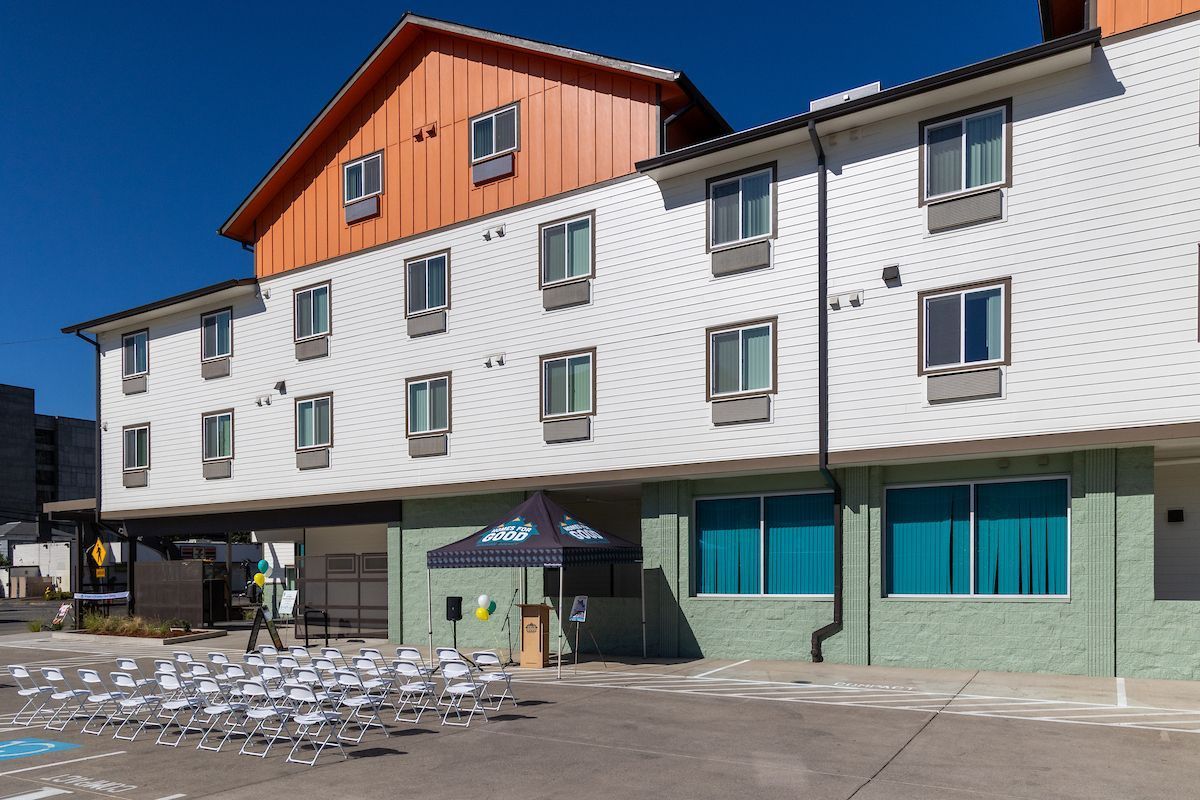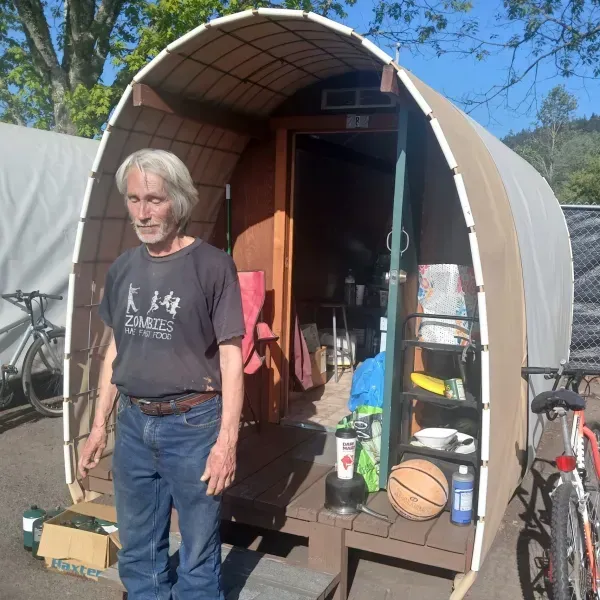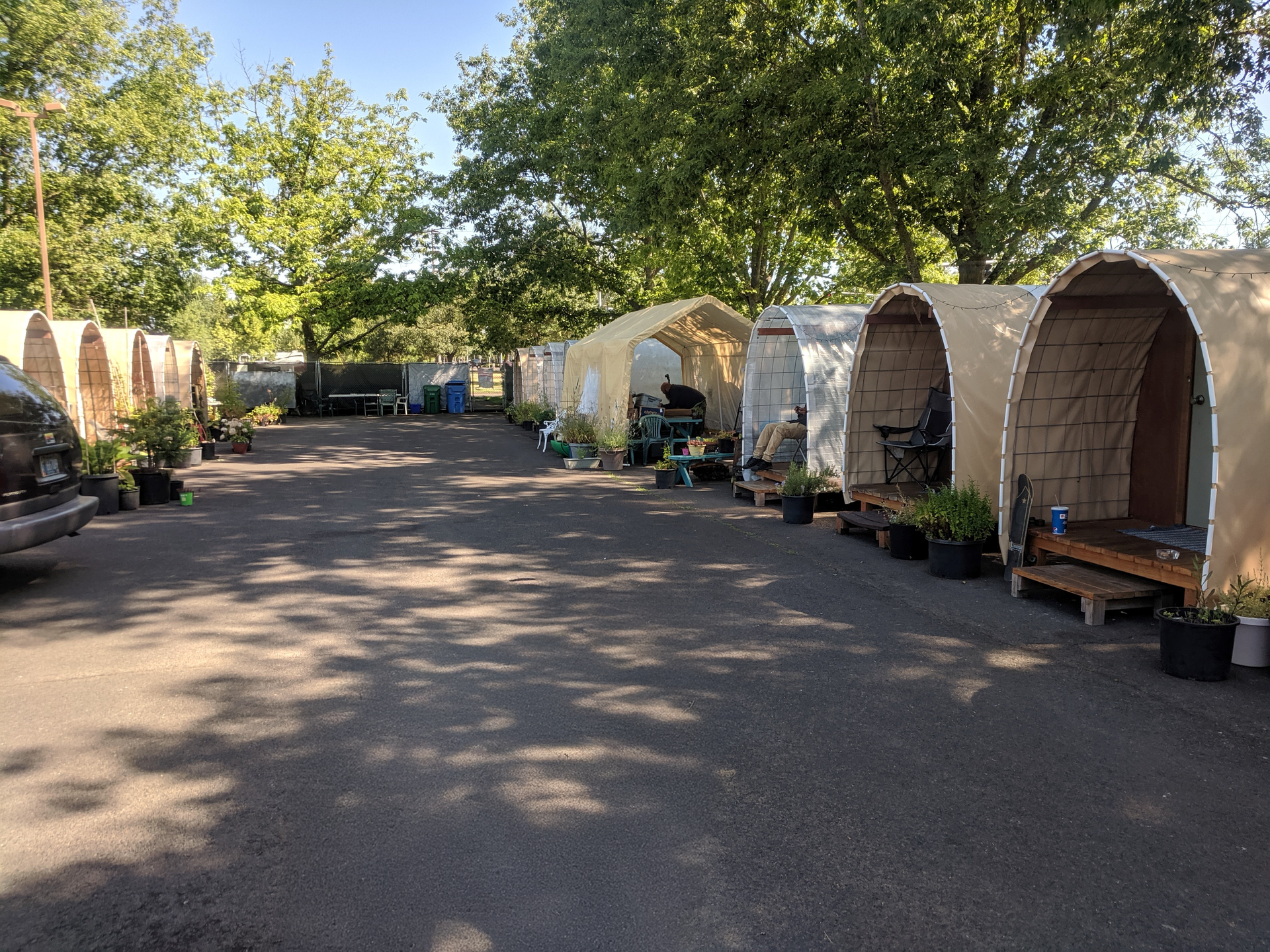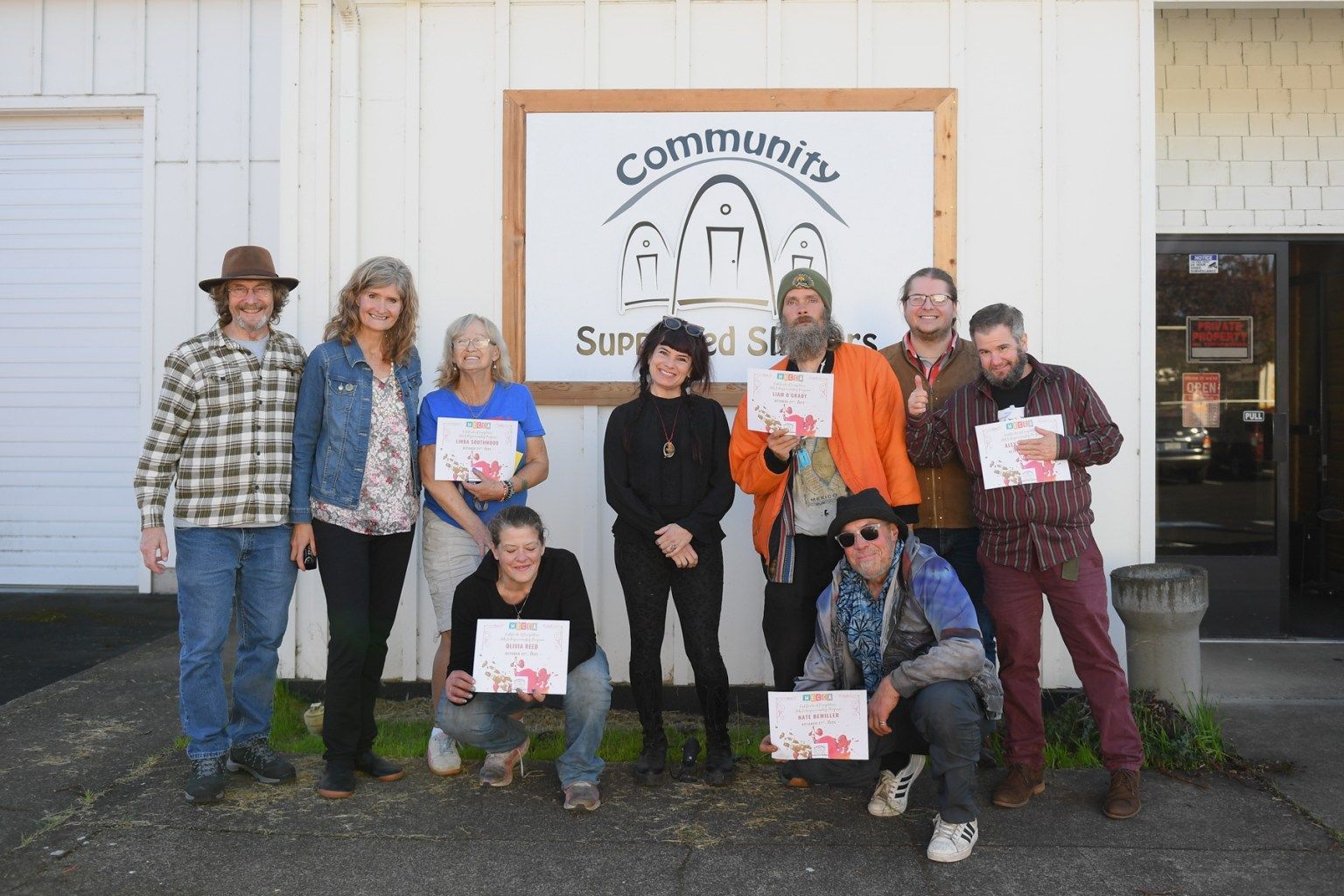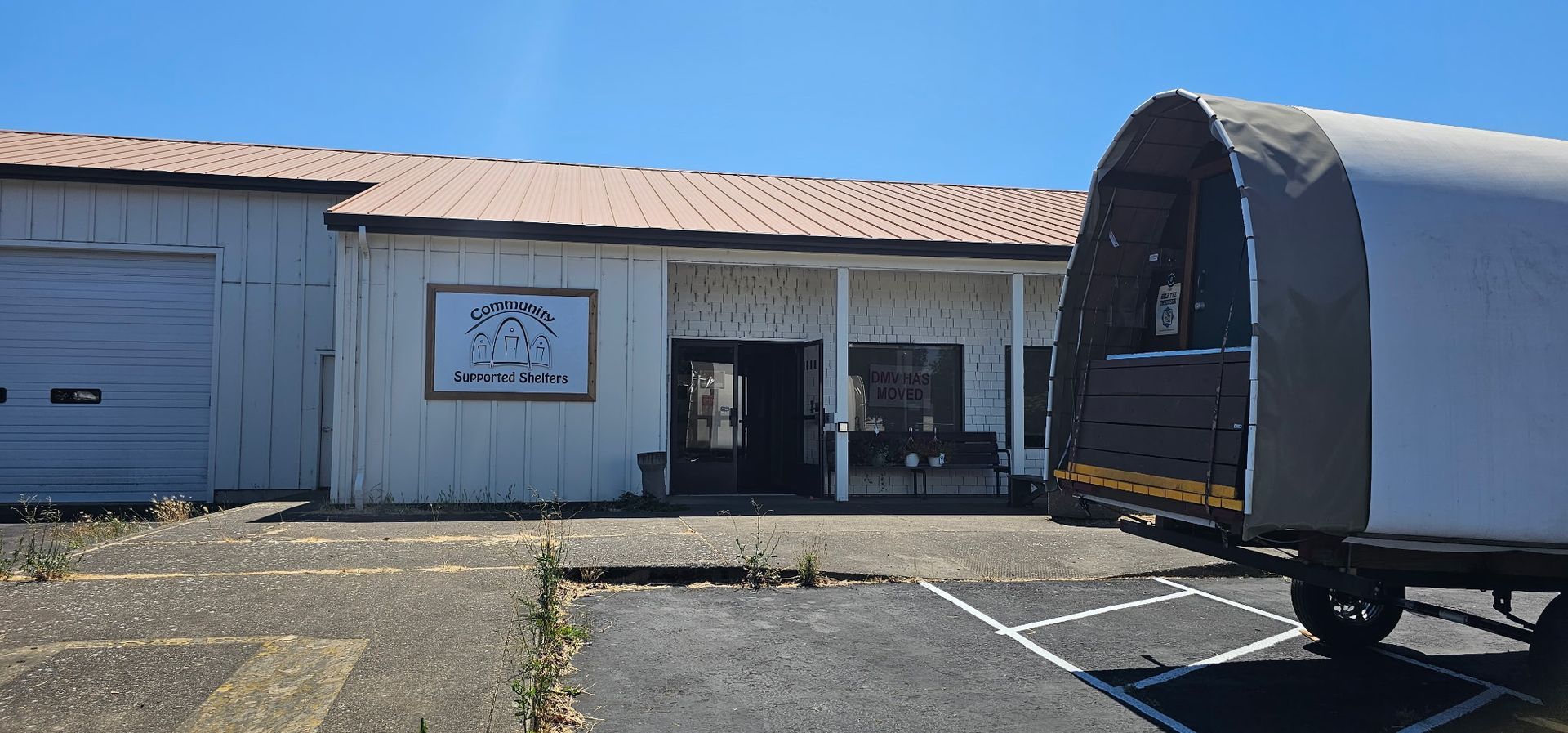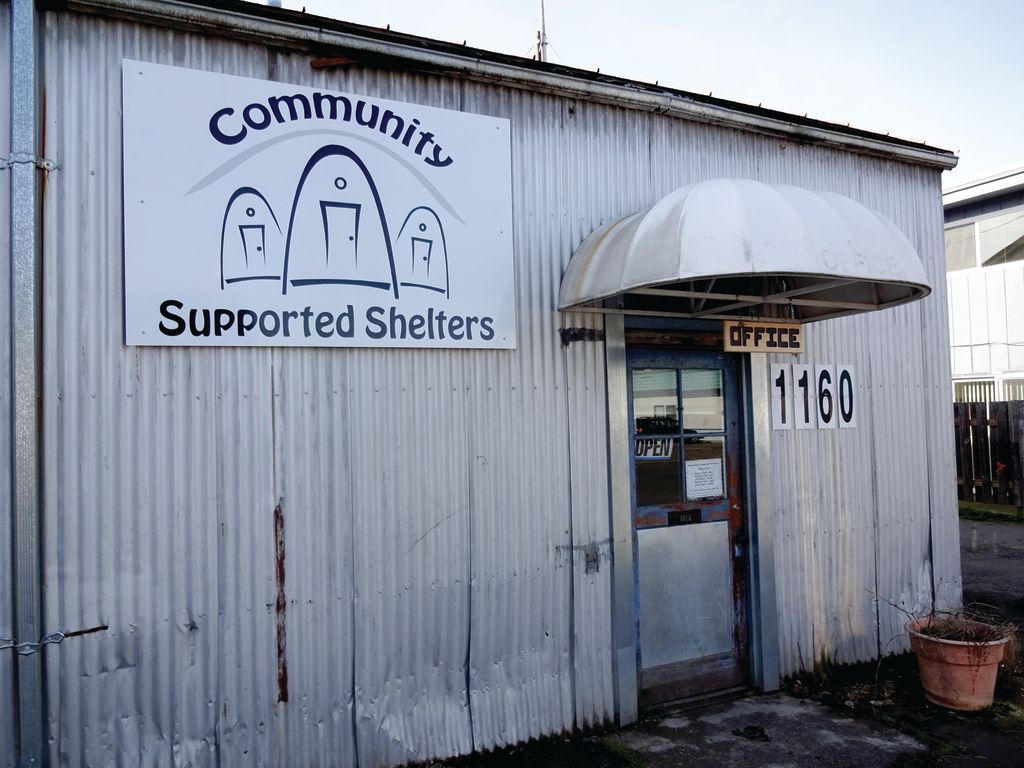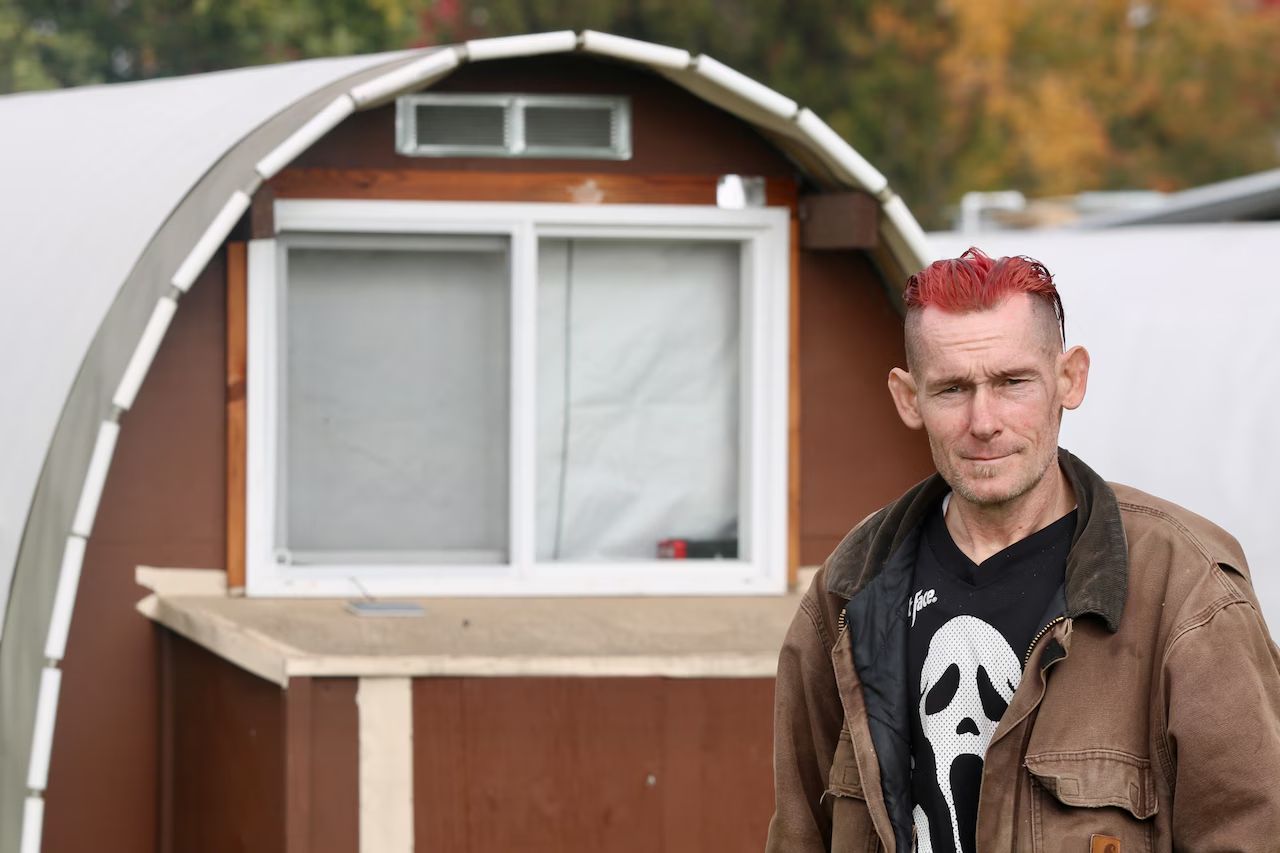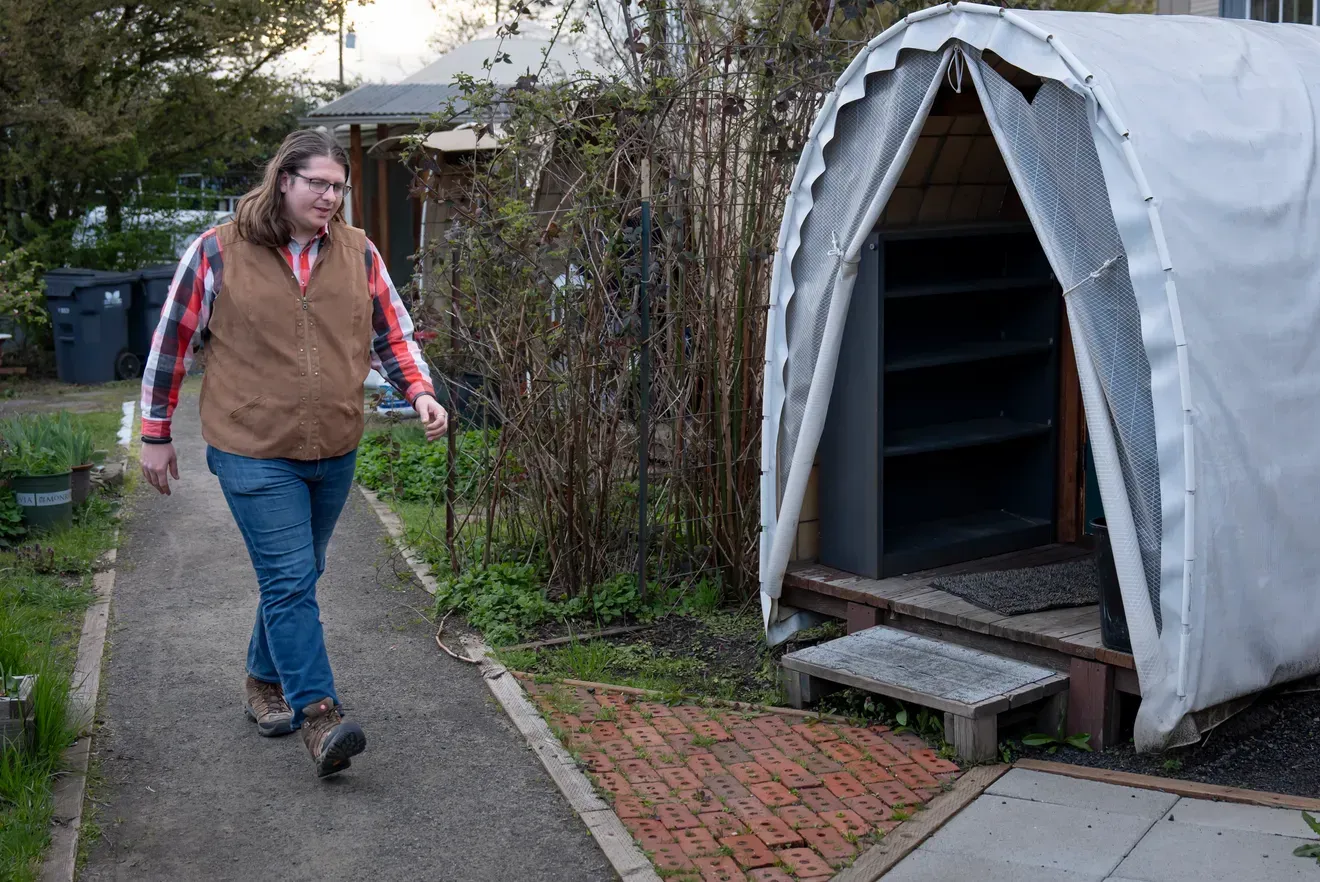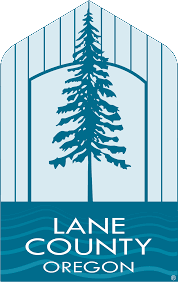Hut Residents – Site Needed
Oct. 30, 2014
Doug: “When it was snowing . . . we would have died. This Hut saved our lives.”
Chris: “I feel absolutely blessed and thankful to have a place like this.”
Chris and Doug Smith are 37-year-old twins who are frequently seen pushing carts and collecting bottles and cans around more than 700 square blocks of south and west Eugene. Doug has been in Eugene about seven years and Chris about five. They moved into the demonstration Conestoga Hut in front of Community Supported Shelter’s shop in late fall. CSS is trying to find a location for two Huts for them to move into.
Q. What kind of work did you do before you started collecting cans and bottles?
Doug: I worked for Market of Choice for three years, and then I went to Safeway and it was about two years there. I was a manager at Safeway. Unfortunately, I think they kind of downsized. It was a slower Safeway.
Chris: It’s funny, there’s been like 10 different people who drove up to me and said, “Why is your brother not at Safeway? He was their best guy. I only came there for him.” They were like, “Why him?” Me and my brother hear that all the time. I’ve worked about everywhere pretty much in this town. I’ve been laid off a lot of times. I’ve worked at Old Navy, T.J. Maxx, a gas station, J.C. Penny, Jerry’s, Goodwill.
Doug: The funny thing is he did he not get fired at one of them.
Chris: I was never written up one time.
Doug: Not a single write-up.
Chris: Never missed a day of work. I was never late.
Doug: Wasn’t late one time.
Q: How long have you been collecting bottles and cans?
Chris: Too long.
Doug: Gosh, it’s been a little over two years, I’d say. At first, we started just sparingly.
Chris: Yeah, we kind of found that by accident. We were turning in our bottles one day. Walking down the road, we found a bunch on the way. A couple people saw us, and they said, “You can take mine, and every week if you want them, you can have them.” By the time we got done, we’re like, “Jeez we just made almost $20. We don’t have work right now, we may as well give it a shot.”
Doug: Yeah, you’ve got to do what you’ve got to do.
Chris: We’d look for jobs and then no one calls you.
Doug: No one calls for the job, so we’re like, “All right, we’ll try to do something to make it.”
Chris: We didn’t really want to do it. It’s not like the most . . .
Doug: Yeah, it’s not really glamorous.
Chris: It’s definitely kind of embarrassing.
Doug: Sometimes it’s humiliating and embarrassing.
Chris: But to make ends meet and to have things, you’ll do anything.
Doug: We’re not lazy, though. We don’t want to not have stuff.
Chris: I don’t care how hard the work is.
Doug: I don’t care what I’ve got to do to work. It shows what kind of work ethic we have—we got laid off and we’ve taken like two days off collecting cans in two years. We still went out in all that snow.
Chris: Not the first day because that was just too much.
Doug: But after that, we grabbed some carts and pushed them through the snow. So obviously, we wouldn’t call in sick to a place where you do a lot easier work. That just kind of shows what happened to us in our jobs because we have the choice now, and we go out every single day. You can’t get laid off from doing bottles. So no one can ever tell me I can’t do that— not work. So, if I can do that and make some money for some food—and we like energy drinks and a pizza every day—then I’m going to do it.
Q: How do people react to you when you’re collecting bottles and cans?
Chris: Most of it’s good, but there are the occasional people who will look at you funny. I had one who was, like, “I wouldn’t push a cart, I’d be embarrassed.” And he’s on a truck with a job, and I was like, “You have a job, right? Did you get laid off? No. Well that’s why you’re not doing it. If you really wanted something, and you didn’t want to not have stuff, if you were driven enough . . .”
Doug: Yeah, if you wanted to still have stuff even though you weren’t working at the time.
Chris: I’d like to see how many jobs he kept over the last 10 years. If he’s been working there his whole life, well, I’ve been laid off eight times and for no reason. I can see why I’ve continued to do this because at least I’m not going to lose this.
Q: Some people admire how hard you work and how persistent you are. Does that surprise you?
Chris: Yeah, kind of.
Doug: It’s actually nice.
Chris: It’s nice but at the same time . . .
Doug: It’s not like we’re proud of it.
Chris: I wouldn’t call it shame, but it’s still . . .We’ve always worked our whole lives so we’re not used to doing this. We’re not used to this life. I was wearing a $1000 suit and making $30 an hour in Fresno. I worked at Macy’s.
Doug: I was a claims adjuster and had my own office and everything.
Chris: Yeah, he made really good money, too . . . Go from wearing a suit and a tie . . .
Doug: A suit and a tie and your own office to pushing a cart with cans, so you’re not super proud of it, but it’s still nice to know that we totally inspire people, that still makes you feel good because at least you know that there are still good people in this town who aren’t judging you. I’ve never judged anybody myself. If I see people trying, I don’t judge anybody no matter what.
Chris: I’m not going to look down on anybody.
Q: Where were you sleeping before you moved into the demo Hut?
Chris: We stayed at the Mission for a while. In the summertime, they changed the rules there. They made it where you have to stick around there half the day and work and do stuff, which we didn’t mind doing but it was easier to pay the two dollars. We even stayed at the park in the summer time. We’d just camp out there.
Doug: Yeah, we’d sleep out there for a few hours.
Chris: It was warm outside and we’d only sleep for five or six hours, we’d lie down, then wake up and go do our thing.
Doug: Erik [de Buhr, executive director of CSS] ran into us and let us know that they had Huts and he was going to try to get us a Hut. There wasn’t anything available right away, so he let us stay at the demo one temporarily.
Chris: We wouldn’t have made it. If we couldn’t go to the Mission for some reason, because they even have a lottery thing during that cold weather spell. I don’t know what we would have done.
Q. How did sleeping in the Hut change your lives?
Doug: Oh gosh, it’s completely different. When it was snowing the other week, we would have died. This hut saved our lives.
Chris: Yeah, we have no body fat. Cold is the only thing we can’t handle. We grew up in LA, in warm weather. I mean we were cold even in the summer time. If it wasn’t for him I don’t know what we would have done. I have no clue. It was snowing and negative 15, what would we have done?
Doug: We were in here when it was snowing—and we were like, “What would we have done, there’s a foot of snow on the ground, and we can’t go to the Mission if they were full or whatever.” Where would we go?
Chris: Just to have shelter and not be cold at night, to have somewhere to go. The first night that we were in here, it’s funny. . .
Doug: We were thrilled to death.
Chris: . . . I lived in a really nice condo in Fresno. Now I feel absolutely blessed and thankful to have a little place this like this. This is awesome. It definitely humbles you, a lot, but it’s still great.
Q: Do you think getting more Huts out in the community can make a difference?
Chris: I think that would be awesome. There was a little article in the opinion section in yesterday’s paper and they were talking about homelessness, and they said they should try to do something about it, and I think the Huts are an excellent idea.
Doug: Especially with the weather here. It’s wet and it’s cold.
Chris: And we’ve heard about people dying. A couple of people at the Mission have died. I think one of the guys down there froze to death.
Doug: By Albertson’s, there’s a tree where this homeless guy used to always sit and there’s a cross there now and we’re thinking, “Did he freeze to death?”
Chris: He was a drinker but it’s still one of those things.
Doug: But think about it, there’s Huts now that people could have and those people would be alive right now if they had a Hut. Just imagine how important that is.
Chris: Just to save one life would be unbelievable, and who knows maybe they would have turned their life around and moved on. But now they’re gone.
Doug: Exactly, if they had a Hut, maybe they could turn their life around and make it better, if they had a place and they had some optimism.
Q: What are your long-term plans or hopes?
Doug: Still looking for jobs, looking for anything that says full-time because when somebody says 12 hours a week, 12 hours a week after federal, state, Medicare—all those taxes . . .
Chris: Even if it’s 20 or 30 hours, unless you’re making a good wage, it’s not enough to survive
Doug: If you’re making minimum wage and working 12 hours a week, how much are you really getting? Like $50? We can each make that in a couple of days collecting.
Chris: I think my job history has also got me to not put 100% into looking for work, which I should. But I’ve had a lot of ups and downs—to get a job, get into a place, get a vehicle, you’re set and then you lose it and then do it again and lose it. To have to go through that again, it bothers me so much, I don’t want it to happen to me again. But probably some time we have to get on to something more . . . we can’t do this the rest of our lives.
Doug: We’re also planning to go to college because we’ve talked to some people who say that you can get financial aid and take some classes. We used to work out a lot, and we like nutrition, some field like that—I know a lot of those fields like physical therapy are overfilled but maybe something like that. We’ve got some college in our background.
Chris: I’m pretty much open to anything. There’s a couple of different areas, but a lot of times, you’ll go to college and then you’ll find something that you’re really interested in or you’re really good at.
Doug: You can find out while you’re there. Definitely we’re needing to do that and wanting to, also.
Chris: Like I say, every day it’s usually been like we look for a couple of jobs and stuff but we’re still going to need money to get stuff now, so we think let’s at least go out for a couple of hours. Everyday, we’re just, like, “There’s money out there. We can at least do something for right now.”
News & Events
To stay connected to CSS, subscribe to our quarterly newsletter. If you are a member of the media who is seeking info, contact
community@cssoregon.org.
